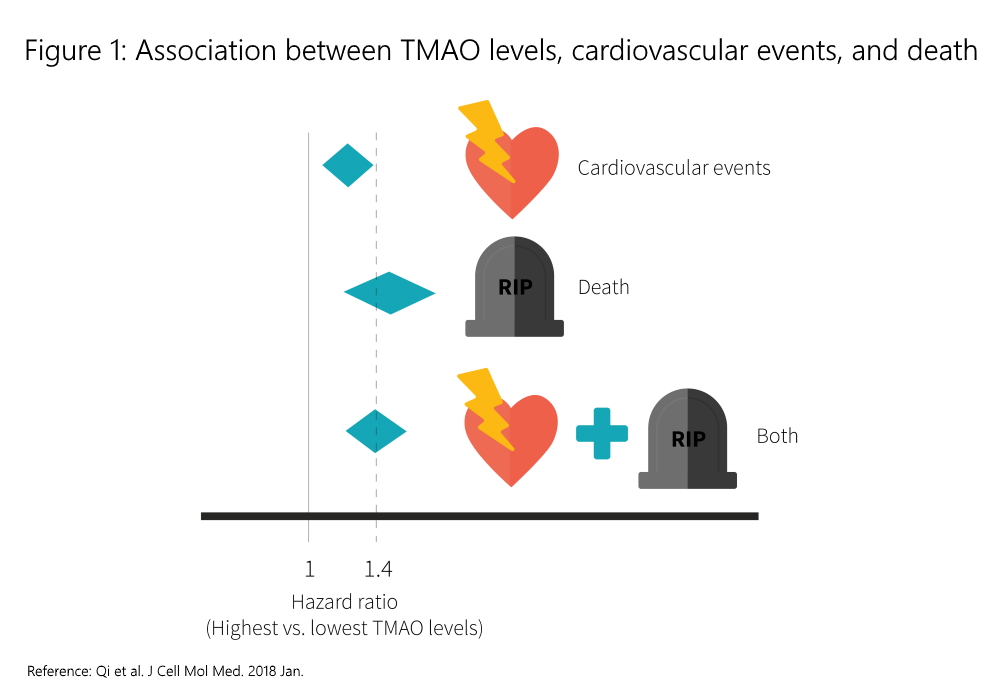Summary
Trimethylamine N-oxide (TMAO) is a compound generated by gut microbial metabolism that has been implicated in increased disease risk. Systematic reviews and meta-analyses[1][2] (whose results are shown in Figure 1) determined that TMAO is associated with a significantly higher risk of both all-cause mortality and cardiovascular events. One possible mechanism for TMAO's effects may be disruption of cholesterol transport by increasing forward transport and decreasing reverse cholesterol transport[3]. However, whether these associations are actually causal is open to question.[4][5]

TMAO has been shown to be generated from substrates with a trimethylamine (TMA) moiety such as L-carnitine and choline[3]. L-carnitine is found in a variety of both plant and animal sources. However, levels of free L-carnitine are highest in meat products[6] and very low in fruits, vegetables, nuts, and grains. L-carnitine is also added into some popular energy drinks[7] with the expectation that it increases performance and helps to burn fat, although the evidence for those expectations is not clear. While vegetarians and vegans have considerably lower dietary intake of carnitine, studies show that their circulating levels in the blood are not drastically lower than people who consume meat and remain generally within the normal range[8]. This is because carnitine can be synthesized in the liver, kidney, and brain[9] if not enough is consumed in the diet.
Several studies[10] have now demonstrated that dietary L-carnitine can be converted in the gut to TMA, at which point TMA can then be converted to TMAO in the liver by the enzyme flavin monooxygenase. However, researchers in 2013 discovered that a compound called γ-butyrobetaine (γ-BB) was formed[11] as an intermediate between L-carnitine and TMA formation in mice.
Examine Database: TMAO
| Intervention | Grade | Effect | Detail |
|---|---|---|---|
| Fiber | D | ||
| PQQ | C | ||
| L-Carnitine | C | ||
Create a free account to unlock more rows for free. Or unlock everything with an Examine+ free trial. | |||
Research FeedRead all studies
In this systematic review and meta-analysis, there was no clear association between eating eggs and an improvement in gut bacteria levels or markers of inflammation.
References
Examine Database References
- L-Carnitine - Joanna J Samulak, Angelika K Sawicka, Emilia Samborowska, Robert A OlekPlasma Trimethylamine-N-oxide following Cessation of L-carnitine Supplementation in Healthy Aged WomenNutrients.(2019 Jun 13)
- PQQ - Harris CB, Chowanadisai W, Mishchuk DO, Satre MA, Slupsky CM, Rucker RBDietary pyrroloquinoline quinone (PQQ) alters indicators of inflammation and mitochondrial-related metabolism in human subjectsJ Nutr Biochem.(2013 Dec)
- Fiber - Wathanavasin W, Cheungpasitporn W, Thongprayoon C, Fülöp TEffects of Dietary Fiber Supplementation on Modulating Uremic Toxins and Inflammation in Chronic Kidney Disease Patients: A Systematic Review and Meta-Analysis of Randomized Controlled Trials.Toxins (Basel).(2025 Jan 26)